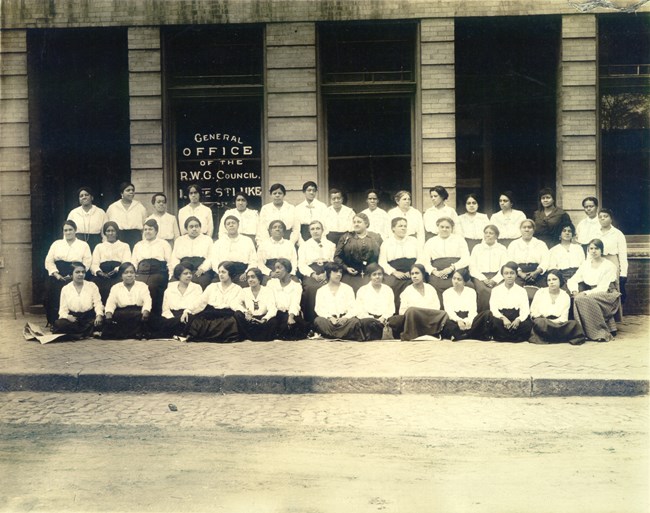Last updated: August 19, 2021
Article
Independent Order of St. Luke

NPS Photo
Maggie L. Walker may be best known as the first Black woman in the United States to charter and be president of a bank, but before she opened her bank, she was the leader of one of the most important fraternal orders in Richmond, the Independent Order of St. Luke. As a Black fraternal order, the IOSL became the main body through which much of Maggie Walker’s promotion of Black economic independence was performed. Her bank, called St. Luke Penny Savings Bank, even bore its name. Now, fraternal orders are no longer a dominant force in Black economic power, but the importance of them, and specifically the Independent Order of St. Luke, lives on in the communities and people they served around the country.
Black Fraternal Orders
Fraternal orders were popular with both white and Black Americans in the late 1800’s, but fraternal orders held different significance to the Black community. Segregation forced the Black community to look inward for support and self-reliance, and fraternal orders were a way to achieve independence and success. Black fraternal orders like the Independent Order of St. Luke had their roots in similar societies formed in Africa among groups like the Igbo- regalia, initiation ceremonies, and the significance of money were present both in the IOSL and Igbo orders. By founding businesses like banks, insurance companies, retail stores, homes for the elderly, newspapers, and more, Black fraternal orders in America created Black jobs as well as created avenues for community members to patronize and support Black businesses. These fraternal orders created a successful insurance economy when working with white insurance companies would not. Among the fraternal orders operating in Richmond during Maggie L. Walker’s lifetime were the True Reformers, The Knights of Pythias, The Odd Fellows and Maggie L. Walker’s Independent Order of St. Luke.
Founding and Early Years
The Independent Order of St. Luke was initially founded in Baltimore in 1867 by a freedwoman named Mary Prout. Under the name the United Order of St. Luke, it provided burial insurance to Black women who could not otherwise access it. While oriented towards women, the organization did allow men, but in 1869, a dispute caused it to split into two factions. The largest faction moved to Richmond and became the Independent Order of St. Luke, run by a man named William M. T. Forrester. Forrester ran it until the late 1890s, but over those thirty years its membership dwindled to a low 1,000 members, and the organization teetered on the brink of financial ruin.
Maggie Walker and the IOSL
When she was sixteen Maggie L. Walker joined the Independent Order of St. Luke after being introduced by a leader in her church, the First African Baptist Church. She rose through the ranks of the organization, helping to start its juvenile department to gather children as members and also took a seat on the leadership council. In 1899 the Grand Right Worth Secretary, William M.T. Forrester decided to step down from the leadership role and Maggie L. Walker stepped up to take over leadership of the fraternal order. She quickly began rebuilding the order doubling its membership in two years and in 1903 she paved the way for its new headquarters, St. Luke Hall. Under her thirty-five-year tenure, the IOSL expanded nationwide to twenty-six states and at its peak boasted 100,000 members. She was, at the time, the only woman known to be leading a major Black fraternal order. It was her policy for the IOSL to use “cooperative economics” to uplift the Black community. Maggie Walker aimed to use St. Luke’s resources to build businesses employing Black workers (especially Black women), and also provide the community with Black-owned businesses to patronize. Maggie Walker oversaw the founding of a department store, a newspaper titled the St. Luke Herald, and most notably, the St. Luke Penny Savings Bank.
Legacy
Maggie Walker passed away in 1934 from complications due to diabetes. Her position was taken over by her daughter-in-law, Hattie N. F. Walker, who remained at the head of the IOSL until 1957. The Independent Order of St. Luke disbanded permanently in 1988, after many of its important economic functions were rendered unnecessary. Consolidated Bank and Trust survived until it was bought in 2005, making it the longest-running, independently owned Black-owned bank in the country. St. Luke Hall, the historic headquarters of the IOSL is listed on the National Register of Historic Places. The work of the Independent Order of St. Luke, along with other Jackson Ward Black fraternal orders, contributed to the vitalization of the neighborhood, and helped it earn the monikers “Harlem of the South”, “Birthplace of Black Capitalism” and “Black Wall Street.”
